
Understanding governance in wizarding societies involves grasping a blend of ancient traditions and modern institutions. It's shaped by the influence of powerful magical families and guided by the Council of Elders. The Ministry of Magic stands as the central authority, overseeing law enforcement, magical transportation, and creature management. The Wizengamot guarantees justice through a structured legal system, sometimes using Veritaserum. Aurors and various specialized units maintain peace. Public participation is crucial, as is continuous education in magic and governance. Diplomatic efforts keep inter-society relations stable. For the complete picture, there's much more to learn about these fascinating aspects.
Historical Background
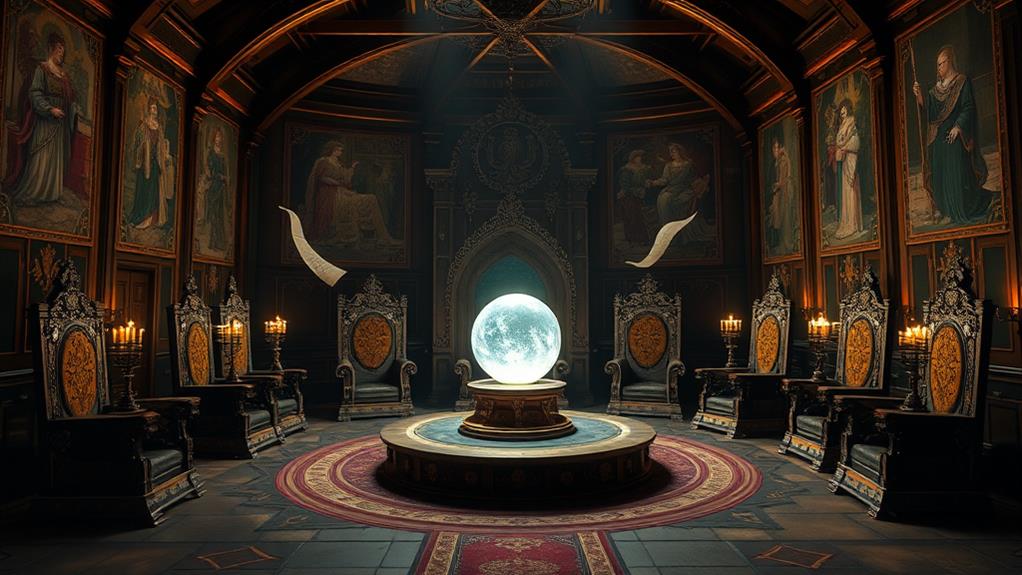
When delving into the historical background of governance in wizarding societies, you'll find it steeped in rich traditions and ancient practices. Wizards and witches have always valued structure and order, ensuring their magical communities remained hidden yet functional. Early governance often involved powerful magical families exerting influence over their regions, creating a patchwork of feudal-like territories. These families, known for their magical prowess, played pivotal roles in shaping legal and social norms.
In ancient times, magical communities faced threats from both non-magical humans and dark wizards. To protect themselves, they established secret councils and regional assemblies. These early governing bodies were responsible for creating laws, mediating disputes, and organizing defenses. You'll notice that many of these ancient laws and customs have influenced modern wizarding governance.
As magical societies grew more complex, so did their systems of governance. The need for a more unified approach led to the formation of larger, more organized governing bodies. These entities often took inspiration from the early councils but expanded their scope and authority. Throughout history, the emphasis on secrecy, community welfare, and magical ethics has remained central to wizarding governance, ensuring the stability and continuity of their hidden world.
Council of Elders
Building on the rich traditions and ancient practices of early wizarding governance, the formation of the Council of Elders marked a significant evolution in magical leadership. You'd find this council composed of the most experienced and wise witches and wizards from various magical disciplines. Their main purpose was to offer guidance, mediate disputes, and make pivotal decisions affecting the wizarding community.
When you examine their structure, you'll notice that members were often selected based on their contributions to magical society and their profound knowledge. It wasn't just about power; it was about wisdom and the ability to see the larger picture. Each Elder brought their unique perspective, creating a balanced and well-rounded body of governance.
You'd also see that the Council of Elders played a pivotal role in maintaining magical traditions while adapting to the changing needs of the wizarding world. They were responsible for enacting laws, overseeing magical education, and ensuring the protection of magical creatures. By doing so, they maintained order and fostered a sense of unity among witches and wizards.
Ultimately, the Council of Elders served as the moral and ethical compass of the wizarding society, ensuring that decisions were made for the greater good.
Role of the Ministry
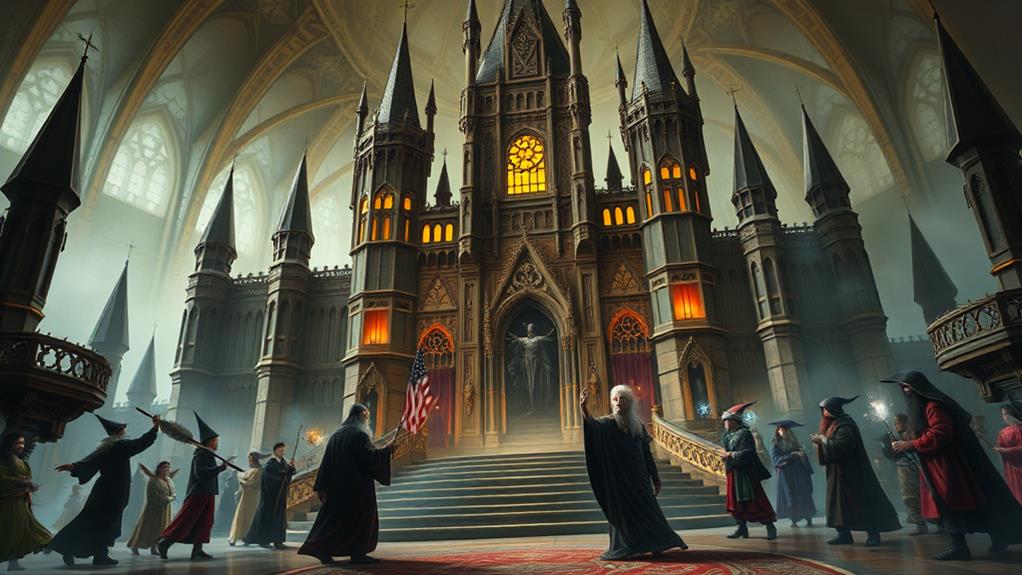
The Ministry of Magic stands as the central governing body in wizarding societies, wielding considerable authority and responsibility. You're likely familiar with its various departments, each tasked with specific areas of governance, from magical law enforcement to magical creature management. The Ministry's role is multifaceted, ensuring the smooth operation and safety of the magical community.
In your daily life, you might interact with the Ministry in various ways. Need a permit for a new potion? That's the Department of Magical Law Enforcement. Want to travel internationally? You'll deal with the Department of Magical Transportation. Below is a table to give you a clearer picture:
| Department | Responsibility |
|---|---|
| Department of Magical Law Enforcement | Oversees magical laws and regulations |
| Department of Magical Transportation | Manages magical travel and permits |
| Department for the Regulation and Control of Magical Creatures | Handles magical creatures and their rights |
These departments function together to maintain order and protect the wizarding world. The Ministry also interacts with Muggle governments, ensuring that magical activities remain hidden from non-magical communities. Every decision made impacts your daily life, whether you're aware of it or not. So, while the Ministry might seem distant, its role is undeniably vital in maintaining the balance and secrecy of the wizarding world.
Judicial System
A well-structured judicial system is essential for maintaining justice and order within wizarding societies. In your community, trials are primarily conducted by the Wizengamot, the high court of the wizarding world. This respected body usually consists of seasoned witches and wizards who evaluate evidence and make judgments. When you find yourself or someone you know facing trial, the Wizengamot guarantees that procedures are followed rigorously to uphold fairness.
You're likely aware that the judicial process begins with an investigation and the gathering of evidence. Accused individuals have the right to defend themselves, often represented by a Defense Advocate. The Wizengamot listens to both sides, asking probing questions to uncover the truth. They deliberate carefully before delivering a verdict. If found guilty, the sentencing can range from fines to imprisonment in Azkaban, the notorious wizarding prison.
Moreover, the judicial system incorporates various magical elements like Veritaserum, a truth-telling potion, though its use is strictly controlled to prevent abuse. Overall, your judicial system aims to balance magical abilities with ethical considerations, certifying that justice is served while safeguarding individual rights. This structured approach helps maintain trust and stability within the wizarding world.
Magical Law Enforcement
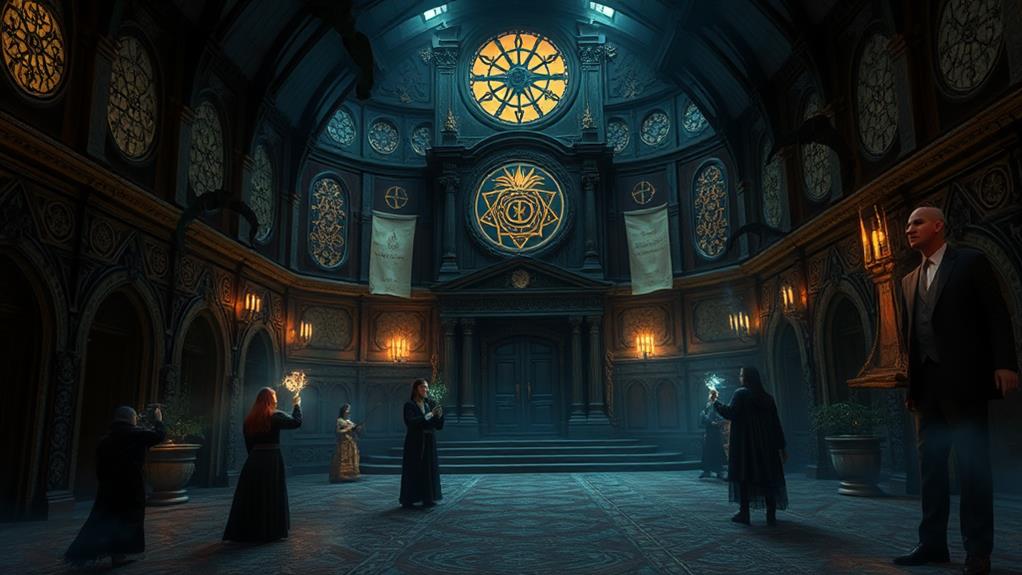
Effective magical law enforcement is essential for maintaining peace and security within wizarding societies. You need a system that's both efficient and fair, given the unique challenges posed by magical abilities. The Aurors, often considered the elite of magical law enforcement, play a pivotal role. They're specially trained to deal with dark wizards and magical creatures that threaten the community.
You'll find that the Department of Magical Law Enforcement, the largest department in the Ministry of Magic, oversees various specialized units. This includes the Misuse of Muggle Artifacts Office, tasked with preventing enchanted objects from harming non-magical folk, and the Magical Law Enforcement Patrol, responsible for general policing duties.
To guarantee effectiveness, magical law enforcement agencies use advanced magical tools and spells. These include Veritaserum for truth-telling, Sneakoscopes for detecting deceit, and various protective enchantments. Forensic magic also plays a role; wizards use spells to uncover hidden evidence and trace magical signatures.
Training is rigorous. You're expected to master defensive spells, magical creature handling, and investigative techniques. Without these stringent standards, the risk of magical crimes escalating would be too high, jeopardizing the fragile balance within wizarding societies.
Inter-Society Relations
Traversing inter-society relations in the wizarding world requires a delicate balance of diplomacy and mutual respect. You need to understand that each magical society has its own unique customs, laws, and governance structures. Misunderstandings can easily arise if these differences aren't respected. Diplomatic envoys play a vital role in fostering positive relations between societies. They must be well-versed in the cultural norms and legal frameworks of the societies they interact with.
Effective communication channels are essential for preventing conflicts and ensuring cooperation. Wizarding societies often establish treaties and agreements to outline the terms of their interactions, covering everything from trade to magical creature management. Regular summits and meetings help maintain these relationships and address any emerging issues.
Consider the following table to get a quick overview of key aspects of inter-society interactions:
| Aspect | Importance | Example |
|---|---|---|
| Cultural Norms | Avoiding Misunderstandings | Respecting local magical rituals |
| Legal Framework | Ensuring Compliance | Adhering to international treaties |
| Diplomatic Envoys | Facilitating Communication | Appointing skilled representatives |
Understanding these aspects will help you navigate the complex web of inter-society relations in the wizarding world.
Public Participation
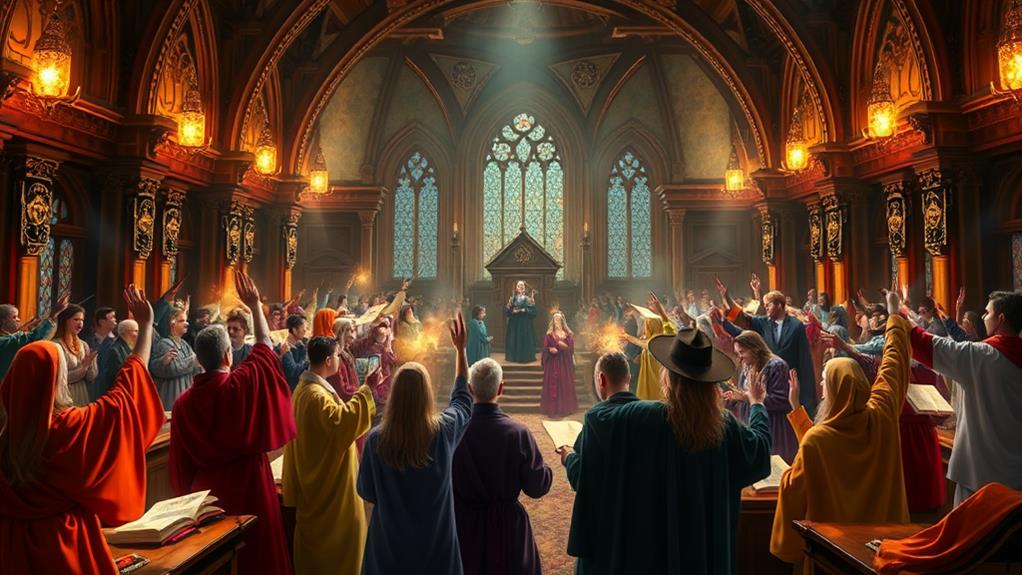
In the domain of wizarding governance, public participation is essential for ensuring laws and policies reflect the will of the magical community. When you engage with the governing bodies, you help shape a society that mirrors your values and needs. Active involvement isn't just a right but a responsibility for every witch and wizard.
- Attend Town Hall Meetings: Be present at local gatherings where issues are discussed and decisions are made. Your voice matters.
- Vote on Key Issues: Whenever there's a referendum or an election, cast your vote. It's one of the simplest yet most powerful ways to participate.
- Join Advocacy Groups: Whether it's for magical creature rights or potion regulation, these groups amplify your concerns and push for change.
- Submit Proposals: Have a brilliant idea? Submit it to the Ministry of Magic or your local council. Innovation often starts with grassroots efforts.
- Engage in Public Debates: Use platforms like The Daily Prophet or Wizarding Wireless Network to share your views and challenge policies.
Education and Training
Public participation lays the groundwork for a representative and responsive governance structure, but the strength of wizarding societies also hinges on robust education and training. You'll find that wizarding schools, like Hogwarts, play a vital role in preparing young witches and wizards. These institutions don't just teach spells and potions; they instill values like responsibility, ethical use of magic, and civic duty.
As a student, you're not only learning from textbooks but also from hands-on experiences. Extracurricular activities, such as student councils or clubs, offer a chance to practice leadership and teamwork. You'll see how these experiences shape future leaders who understand the intricacies of governance from a young age.
Moreover, specialized training programs for adults guarantee that ongoing education isn't neglected. Courses on advanced magical law, public administration, and conflict resolution are pivotal. They help you stay updated on new laws and policies, guaranteeing you're well-equipped to handle the challenges of modern wizarding governance.
Crisis Management
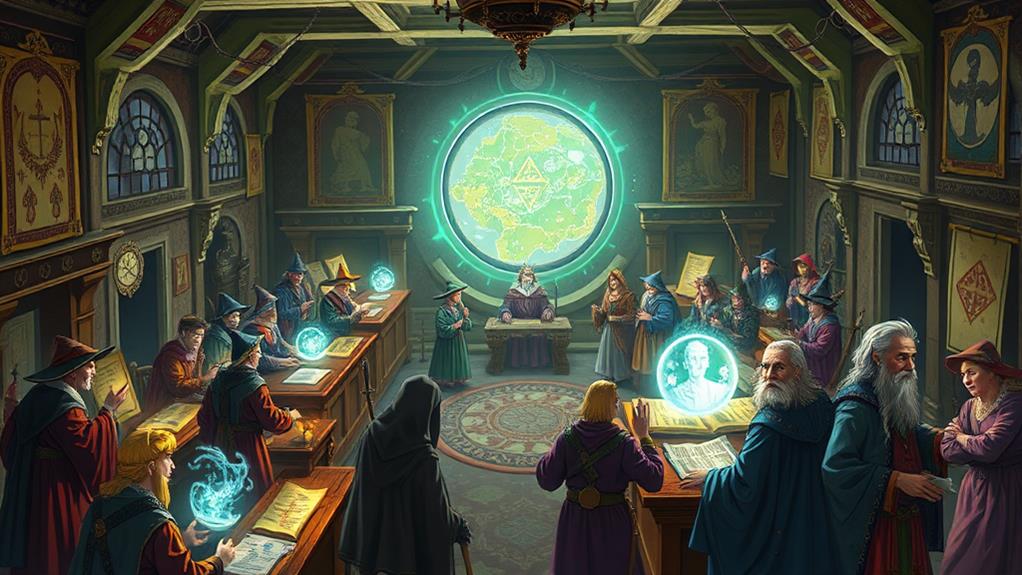
Effective crisis management is essential for the stability of wizarding societies. When unexpected situations arise, you need to act swiftly to protect both magical and non-magical communities. A solid crisis management plan involves several key components that guarantee you're prepared for any scenario.
- Early Detection: Identify potential threats before they escalate. Constant vigilance and intelligence gathering are pivotal.
- Clear Communication: Keep everyone informed with accurate and timely updates. Misinformation can cause panic and chaos.
- Resource Allocation: Verify you have access to necessary resources, including potions, magical artifacts, and skilled personnel.
- Community Coordination: Work closely with local and international wizarding authorities to manage the crisis effectively.
- Post-Crisis Review: After the situation is under control, analyze what worked and what didn't to improve future responses.
At a Glance
Now, you've got a clearer picture of how wizarding societies tick. From the wise Council of Elders to the vigilant Magical Law Enforcement, every cog in this enchanted machine has a role. The Ministry's decisions, the courts' judgments, and the people's voices all weave together like an intricate spell. Remember, in times of crisis or peace, it's the education and training that arm every witch and wizard. Step into this world, and you'll see magic in governance.






